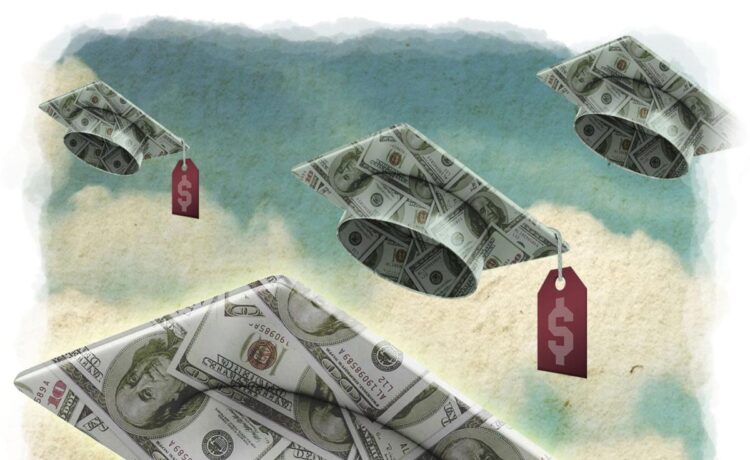Three-fifths of parents with adult children gave them financial help in the past year, Pew Research reports in a new study.
The finding illustrates — in case we needed a reminder — that modern parenting does not end when a child turns 18. But supporting an adult child can get costly, financial planners say. And parents need to make sure their own financial needs are met.
Roughly half of under-30 adults live with their parents, prior Pew research has shown. That figure has spiked dramatically over the years.
Americans are marrying later, and waiting longer to have children. Researchers say those trends point to a new life stage, tucked between adolescence and full adulthood. Some term it “emerging adulthood.”
‘Snowplow’ parents clear a financial path for adult children
Young adults face myriad economic challenges in 2024 America. College costs and student debt loads are rising. House prices have soared. Mercurial inflation and interest rates have vexed consumers.
Parents, for their part, seem ever more inclined to carry on with parenting well past the age a child exits childhood, removing every obstacle in their path. Some researchers call it “snowplow” parenting.
“Let’s move everything out of the way, so our kids can walk perfectly down the street,” said Jonathan Abramowitz, a psychology professor at the University of North Carolina.
It’s easier than ever to pay an adult child’s bills, whether the kid lives with you or not. Earlier generations mostly paid their bills by mail. Now, everything’s on apps or online.
Pew reports that 28% of adults ages 18 to 34 received financial help with household expenses, such as groceries or utilities, in the past year; 25% got a parent’s help with a cellphone bill or streaming subscriptions; 17% with rent or a mortgage; 15% with medical expenses; and 11% with education expenses.
Fewer than half of adult children report financial independence
Fewer than half of young adults claim complete financial independence from their parents, Pew reports. Even past 30, one-third of adult children rely on their parents to pay at least some of the bills.
The Pew study, published on January 25, draws on a survey of 4,512 adult children and parents.
Often, parental aid to aging children is relatively trivial.
John Maxwell, a lawyer in St. Louis, is father to three 30-something daughters.
When they finished school, he told them, in effect, “You’re on your own, kiddo.” They got jobs, moved out, and learned to pay their way.
But not entirely. The Maxwell parents still pay for a family cellphone plan and some streaming services. Each year, the parents cover airfare or hotel bills for a family vacation.
The father lent money to his eldest daughter when she was starting out. “But it was a loan, not a gift,” he said.
And that is where the Maxwells draw the line.
“It’s a tough world out there,” John Maxwell said. “You’ve got to learn to stand on your own two feet.”
For aging parents, helping adult children is ‘Parenting 101’
For many aging parents, supporting an adult child seems the very essence of parenting.
“We’d go to the ends of the earth to make sure our children are safe and happy,” said Christopher Lyman, a certified financial planner in Newtown, Pennsylvania, who advises couples with adult children.


Parents who support adult children see their progeny emerging into a different world than the one they knew as young adults, said Teresa Bailey, a certified financial planner in Nashville.
“They feel like the economy is different now, and the world is different, and it’s more difficult for somebody to be fully financially independent,” she said.
Parental aid is fine, she said, so long as the parents can afford it. Some aging parents continue supporting adult children at the peril of their own retirement.
“That’s the first thing we check,” she said. “Are you spending on your children and putting yourself in a situation where they will have to spend on you, because you haven’t saved enough for retirement?”
Bailey projects a couple’s budget to age 90, showing them where their finances are likely to be, based on their patterns of saving and spending.
For couples who spend heavily on adult children, she said, the exercise can yield “a lightbulb experience.”
Many parents who aid adult children hurt their own finances
In the new Pew study, more than one-third of parents who provided financial help to adult children said that doing so hurt their own finances.
“Often, the ones who are providing the support aren’t the ones who can afford to provide the support,” Lyman said.
For adult children on the receiving end of parental largesse, the help can come as a blessing or a curse.
In some circumstances, parental aid can be a godsend: A new graduate struggling with student loans, or a first-time home buyer who can’t quite make the down payment.
Yet, experts say, the help must eventually come to an end.
“It does have a downside,” Abramowitz said, “and that is, it can reinforce that need for dependence. Young adults, they get stuck, because the parents are protecting them, and the kids never learn how to launch.”
Parents who support adult children “have the best intentions at heart,” Abramowitz said.
Still, every so often, he said, they should ask themselves this question: “When does it get in the way of the kid being able to move on with their life?”
This article originally appeared on USA TODAY: Parents use retirement savings to help adult children financially
















